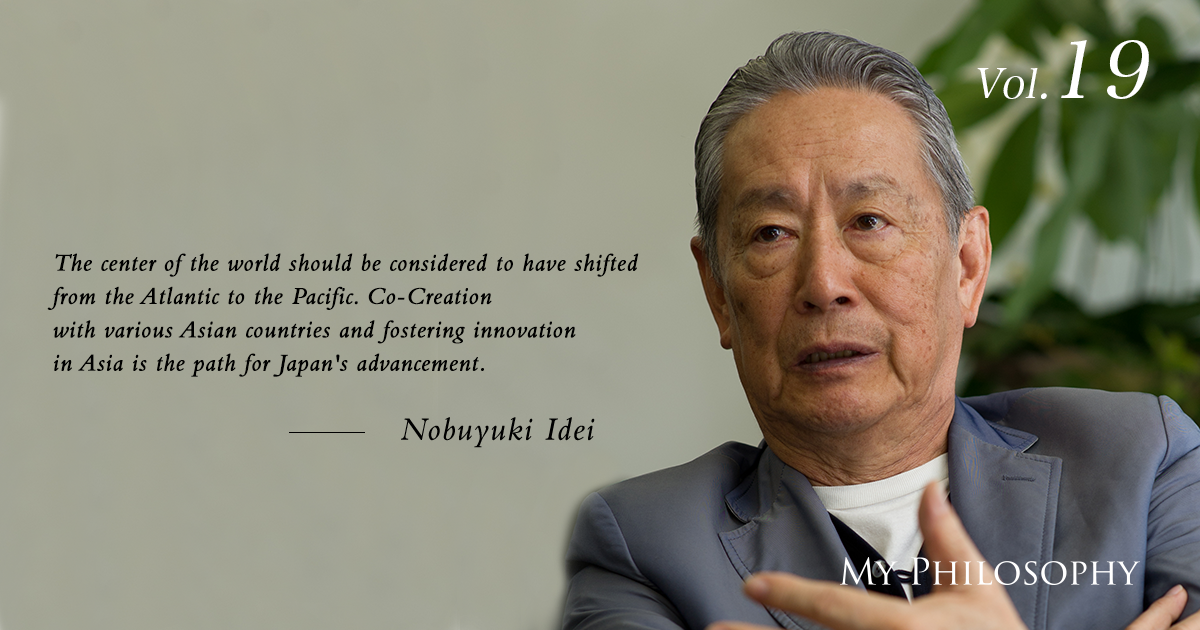
Mr. Nobuyuki Idei has been instrumental in leading Sony Group to global prominence and continues to be a central figure in Japan's economic arena. We had the opportunity to discuss episodes from his time at Sony, his management philosophy, and the future of Japan and Asia.
Profile
Vol.19 Nobuyuki Idei
Founder & CEO, Representative Director of Quantum Leap Corporation
After graduating from the School of Political Science and Economics, Department of Economics at Waseda University, Nobuyuki Idei joined Sony Corporation. He progressed through various roles including the Foreign Division, Head of the Audio Division, and Director. In June 1995, he was appointed President of Sony, the first time since Sony's founding that a new graduate had been selected for the position. He later served as CEO and Chairman. Idei also held positions such as the Chief of the IT Strategy Council of the Cabinet Office, Vice Chairman of the Japan Business Federation (Keidanren), Senior Advisor at Sony Corporation, and outside director for General Motors and Nestlé.
In 2006, he founded Quantum Leap Corporation, a company dedicated to creating next-generation global businesses and leaders from a 'Japan × Asia' perspective. The company focuses on hypothesizing business creation and growth opportunities with a global outlook centered on Asia, and engages in activities aimed at achieving significant progress in Japan and Asia.
*The titles and positions mentioned are as of the interview date in June 2013.
Mr. Nobuyuki Idei passed away on June 2, 2022, at the age of 84. I am deeply grateful that we were able to conduct such an interview while he was still in good health. Having worked together following the interview, I was constantly impressed by his broad perspective and his charm as a man. Thank you for everything! I sincerely pray for his eternal peace. Daisuke Sugiyama, Editor-in-Chief, ‘My Philosophy
Sony was My Competitor.
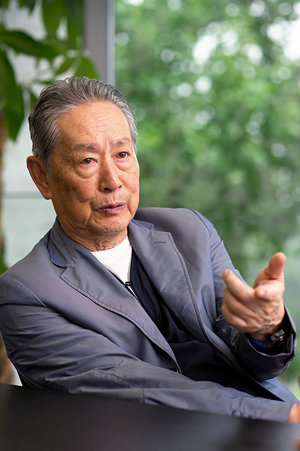
Ever since I participated in practical training during my university days, I believed that Sony would definitely be a growing company. I had the chance to join a major corporation, but I deliberately chose a smaller company. This was because I wanted to grow without losing to the company as it expanded. In that sense, Sony was a competitor for me. A company is like a living organism. It has its own will and develops rapidly. The individuals within it are also living organisms, and in a company where various lives exist, the most important point is to consider what is best for the company rather than one’s own desires.
Until about your early thirties, I think it’s okay to do what you want, but once you are in a responsible position, you must always make the best decisions and act for the sake of the company as a living organism. I have a policy of wanting to be in a position where I can set my own prices as much as possible, and I declined offers for posts at the headquarters. Being a company focused on technology, I never expected the top position to come to a person from the humanities like me. Perhaps Sony took a gamble on the unknown aspects of me, deciding whether to hand it over to someone technical or leave it to someone managerial.
Golf Playing Style and Management Style are Similar.
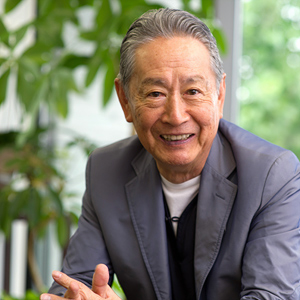
I started playing golf around the age of 30 when I was assigned to Switzerland, and just before becoming president, my handicap score was 13. I thought I could become a single handicap player if I continued as I was, but it wasn’t that easy. My handicap kept dropping, and my seniors would say, ‘You are starting to look like a president, ‘ and when I asked what they meant, they said, ‘Your golf has gotten worse’ (laughs). Golf involves both offensive and defensive elements, similar to management styles.
The outcome in golf is entirely the player’s responsibility, and you can’t make excuses. In work, you might blame someone else’s failure, but that’s not possible in golf. In management, it works well if you select capable people and simply give orders from behind them. However, in golf, you have to do everything yourself, and your true nature shows in how you react to mistakes. Your skiing style also reflects your management style. When descending a slope, some people zigzag while others go straight down—cautious people versus those who take a direct challenge. Akio Morita, one of Sony’s founders, was a person who aimed to go straight down. Also, skiing is not just about how many seconds it takes to descend. That’s why he preferred skiing over golf, where skill is judged by the score.
Create New Value, Not just Restore.
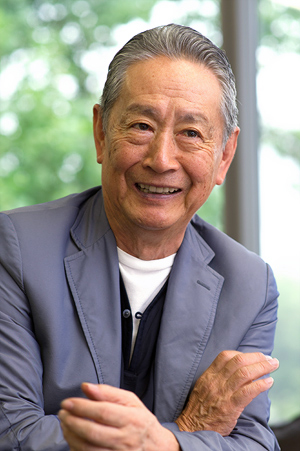
I am currently focusing on three main areas. First is ‘Nurturing’. We are establishing mechanisms to nurture young venture companies and develop successors. Second is ‘Asia’. It’s crucial for Japan to determine its position in its interactions with Asia in the future. For instance, when expanding into Myanmar, it would be disastrous to do so without understanding the essence of Myanmar. It’s important to understand both Japanese rules and the counterpart’s rules, and to grasp which Japanese methods should be retained and which should be adapted. Since 2007, I have been hosting the ‘Asia Innovation Forum (AIF)’ annually, focusing on innovation in Asia. The United States has developed as a hub of innovation. Without generating innovation from Asia, even if it occupies 50% of the world’s GDP, it won’t command respect or gravitational force. We’ve been continuing the forum with the same theme since its inception, and I believe there’s educational significance for Asia in doing so.
The third area is ‘Creation’. Companies must engage in either continuous or discontinuous reforms. When I was managing Sony, we emphasized audio and video while allocating a large workforce to the IT department. From there, the company, which was about 3.5 trillion, jumped to around 8 trillion, achieving a ‘quantum leap’ (a jump that is not on a continuous line). Reform consists of improving existing elements and creating new value. Without clarity on this distinction, continuous reform would merely result in regeneration. It’s not just about lowering costs; strategic thinking is necessary for companies and society to understand what kind of value to create and reform.
Creating the Future Together.
For example, if we only argue about the differences in past perceptions, such as between Japan and China, it will lead to conflict. However, if we strive to work together for the future of Asia, we can align our direction. This concept is based on the ‘co-creation philosophy’ of Professor Hiroshi Shimizu, Emeritus Professor at the University of Tokyo. While incorporating companies with different perspectives through M&A may not be easy, projects that advance with the same vision should be able to ‘co-create’ the future. Furthermore, Japan should consider not just a binary choice between China and the United States for its future positioning, but rather a third solution. People, in addition to work and leisure, need a third “time” for themselves, which is the most important. Family time comes second, but I believe that the use of this third time, the third solution, is crucial in all aspects.
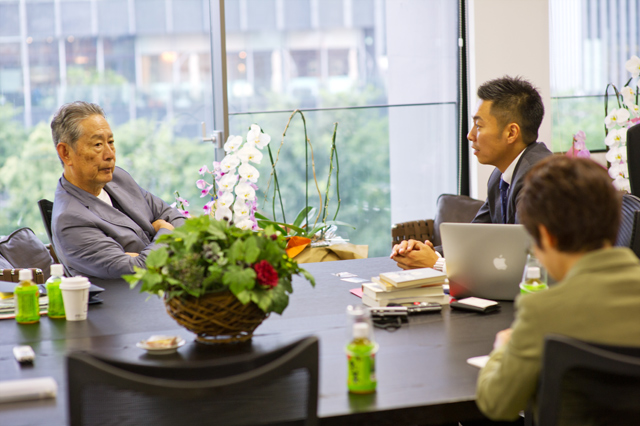

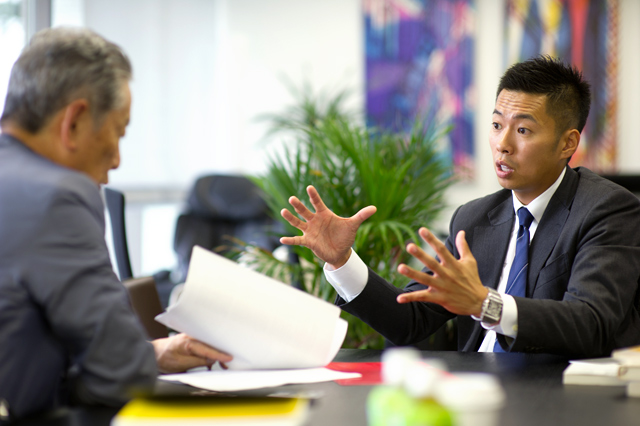
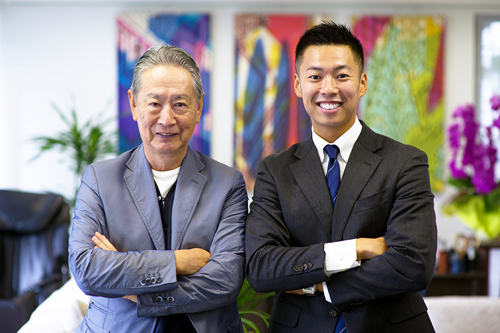
Through the interview with Mr. Nobuyuki Idei, who is a leading figure in Japan’s business world, I sensed that leading Sony for a decade from 1995 to 2005 came with significant stress and pressure, which would be beyond the capacity of an ordinary person’s mental strength. While I had read about Mr. Idei’s management philosophy in his books, the question I most wanted to ask, apart from that, was whether he truly didn’t know he would be appointed as Sony’s president. It seemed that he genuinely didn’t know (laughs).
Management is a continuous stream of worries, and each decision and action, despite being made earnestly, doesn’t guarantee anything. Amidst such uncertainty, I believe it’s about repeatedly making the best decisions one believes in at that moment. From our conversation, I felt that making decisions is a process of overcoming the next obstacle. Mr. Idei, who has entered a phase of developing friendly relationships and nurturing young leaders for the next generation, has inspired me. I aspire to make every effort to ‘quantum leap’ forward, both for our company and for myself, to take the next step.
June 2013, Quantum Leap Corporation Editor: Naomi Kusuda, Photography: Daiki Ayuzawa






























































































































